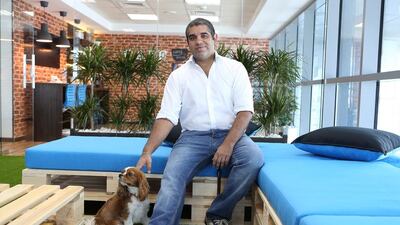We all know that money talks – but for one Dubai-based entrepreneur, the conversation is about much more than that.
Kavit Handa is the chief executive of ReturnHound, an online service that aims to transform “lost and found” globally. It allows staff at hotels and other public places to log lost property, while visitors can register items they have mislaid. If there is a match, ReturnHound quickly arranges a courier, if required, and handles payment for delivery.
But it’s no guaranteed moneymaking machine. ReturnHound allows users, if they wish, to pick up lost items from where they were left and not pay a cent. And while getting something couriered back comes at a price, the only charge ReturnHound itself levies is an optional $5 fee, of which it takes $2, with $2 going back to the employee who found the lost item, and $1 to charity.
That may sound like a somewhat shaky revenue stream. But for Mr Handa – a former Merrill Lynch executive who has launched several ventures – it’s a vital business model for the 21st century.
“Looking at it from a purely financial perspective is very much an old way of doing business,” says the 44-year-old British citizen.
“The world is just becoming too conscious, and information is just too available for you to just sit there and say: ‘I want to grab all the money and pour it into my corner of the room’.”
Mr Handa says businesses that wish to survive these days need to adopt the “triple bottom line” approach – a framework that evaluates organisations according to their financial, social and environmental performance. ReturnHound’s plan, he says, involves giving money to underprivileged children through its charitable platform – called the RH Foundation – as well as helping to prevent unclaimed items going to landfill.
Investors seem to agree with the approach. Courier firm Aramex holds a 20 per cent stake in ReturnHound, an Asian venture capital firm holds 30 per cent, and the company is confident about a potential series A investment round in the next year or so.
Venture capital firms that have not backed ReturnHound say the “triple bottom line” concept has merit.
“We love to invest in businesses that are able to have [something] beyond just the profit objective,” says Dany Farha, chief executive and managing partner of Beco Capital in Dubai. “As long as there is a means to an end from a commercial perspective.”
Mr Farha says Beco Capital had been approached by some start-up businesses that had not yet established how they would make money. That’s OK, he says, as long as the entrepreneur is serious about solving a particular problem.
“If somebody is solving a massive problem they are extremely passionate about, they will find a way to make it a sustainable and profitable business,” says Mr Farha.
ReturnHound was certainly born out of an emotional personal experience. Mr Handa was on holiday in the Maldives with his family, and upon returning to Dubai realised his young daughter Sienna, then six, had left her Minnie Mouse soft toy behind. It was only after several phone calls, and an agonising 18-day wait, that the toy was finally returned.
The entrepreneur started working on ReturnHound last November, and has been in talks with “numerous” hotel groups about adopting the system. Mr Handa says it is free for hotels to use and – while Aramex is a partner – it is “agnostic” as to which courier firm is used to return items.
His vision for the business, which is registered in Dubai and had 14 employees as at the end of May, is to be “the standard for lost and found globally”. He sees it as particularly scalable worldwide because the issue of lost property is “the ignored, troubled child” of hotels and other organisations.
“It’s not sexy enough to attract lots of people,” says Mr Handa. “I can unequivocally tell you that we’re neither the next Facebook nor the next Uber.”
That said, Mr Handa does draw one comparison between his own young venture and web behemoths like Facebook and Amazon.
“These companies didn’t go out on day one saying ‘you know what, I’m going to start a company because I want to make a tonne of money’. They said ‘I want to start a company because I have a purpose’,” he explains.
“If you made $2 a day on the 250,000-odd items that are lost globally every day, that’s $500,000 a day. That’s a lot of money you could make. But if I decide to say ‘I want to make $20 every time someone loses something’, that’s a problem. I don’t want to capitalise on someone else’s misery,” the entrepreneur adds.
“We took a step back and said, ‘what’s our main purpose here?’ And our main purpose with this was not really to go out and make money. It was to go out and change a problem.”
business@thenational.ae
Follow The National's Business section on Twitter

